In order to feel good, it’s not enough to take care of your body and physical well-being; your mental health is equally—if not more—important, too. That’s why many people tend to change their lifestyles or take other measures to take care of their mental well-being.
Take this woman, for instance, who appeared on Caleb Hammer’s ‘Financial Audit’ show, and consequently, on his ‘Finance.Tokz’ TikTok account. Talking to the host, she shared that she considers her mental health a value and that she is not willing to put herself in a situation that is going to make it much worse. However, to that, Hammer replied that she will not be able to find a job and people in the comments had things to say, too.
This woman went on Caleb Hammer’s ‘Financial Audit’ show where she discussed her views on mental health and working
Image credits: finance.tokz
She told the host that she is not willing to put herself in situations that could worsen her mental health
Image credits: Image by Freepik (not the actual photo)
Image credits: master1305 / freepik (not the actual photo)
Image credits: finance.tokz
The snippet from the interview was viewed more than 2.6 million times on TikTok
@finance.tokz She won’t get a job because of her mental health ! #finance #financetok #financefreedom #calebhammer @Caleb Hammer ♬ original sound – FinanceTokz
You can watch Caleb’s full video here or on the YouTube channel
For some people, work provides a sense of purpose, but for others, it can be a reason for their deteriorating mental health
Image credits: Image by Freepik (not the actual photo)
No two people are, feel, or react to things the same way, so it makes sense that what works for one, might not work for another; and that includes work itself. While having a job for some can bring a sense of fulfillment and stability in life, for others, it can take a toll on their mental or even physical health.
According to the World Health Organization, decent work can be good for one’s mental health. The organization suggests that working in a safe and healthy environment can support mental health by providing not only a livelihood, but also a sense of confidence, purpose, and achievement, an opportunity for positive relationships and inclusion in a community, and
a platform for structured routines, just to name a few examples.
However, data shows that, for one reason or another, many people can feel their mental health decline because of work. A survey carried out by Monster last year found that nearly three-in-four workers say they’re mental health at work is either poor (40%) or fair (34%). To make matters worse, close to 70% of respondents believe they work in a toxic environment, which is unlikely to make one’s mental health any better.
Monster’s survey also revealed that 78% of workers don’t think their employer is doing enough to address their mental wellness at work. Out of the respondents who reported great mental health, roughly six-in-ten said that they attribute it to the fact their employers allow time away from the office for doctors, therapy, and other health-related appointments.
Mental health conditions can influence many aspects of a person’s life, including their productivity at work
Image credits: Drazen Zigic / Freepik (not the actual photo)
It’s evident that many people face mental health-related troubles or difficulties, which might interfere with their job performance or influence their decision on what to do/where to work. The Office of Disability Employment Policy (ODEP) notes that mental health conditions can impact various aspects of an individual’s life, including the ability to achieve maximum productivity in the workplace, which is why there are certain laws and policies in place.
According to the ODEP, “Under the Americans with Disabilities Act (ADA) and other nondiscrimination laws, most employers must provide ‘reasonable accommodations’ to qualified employees with disabilities.”
The source continues to point out that reasonable accommodations are adjustments that need to be made at work in order for qualified employees with disabilities to perform the essential functions of their jobs. Some of such accommodations include flexibility regarding the workplace, scheduling adjustments, flexibility regarding sick leave and other arrangements, as well as breaks, among other things.
The woman in Caleb Hammer’s video shared that her ADA accommodations included up to 32 hours a month of time off that is usually paid. She also added that her therapist recommended that she didn’t have a direct boss, all of which led to Caleb saying that she wouldn’t survive. People in the comments had things to say, too, and clearly, they didn’t keep them to themselves.
Many people in the comments sided with the host
Some saw where the woman was coming from
An HR manager in the comments provided her two cents on the matter
Poll Question
Thanks! Check out the results:
She has a fundamental misunderstanding of the ADA. Up to 32 hours of paid time off every month is not a reasonable accommodation.
She's probably never read the ADA, I have because I use a service dog, and just heard the name somewhere. She's made that c**p up out of her head.
Load More Replies...as someone married to a psychologist the vast mayority of the times people say "my therapist said ..." are false. Patients go to the therapist, and decide something, and the therapist say something like "aja" or "hmm", and they take that as implicit consent, and then "the therapist said it". They didn't
It doesn't seem as if she's actually doing something to improve her mental situation. She just seems to accept it.
She has a fundamental misunderstanding of the ADA. Up to 32 hours of paid time off every month is not a reasonable accommodation.
She's probably never read the ADA, I have because I use a service dog, and just heard the name somewhere. She's made that c**p up out of her head.
Load More Replies...as someone married to a psychologist the vast mayority of the times people say "my therapist said ..." are false. Patients go to the therapist, and decide something, and the therapist say something like "aja" or "hmm", and they take that as implicit consent, and then "the therapist said it". They didn't
It doesn't seem as if she's actually doing something to improve her mental situation. She just seems to accept it.

 Dark Mode
Dark Mode 

 No fees, cancel anytime
No fees, cancel anytime 


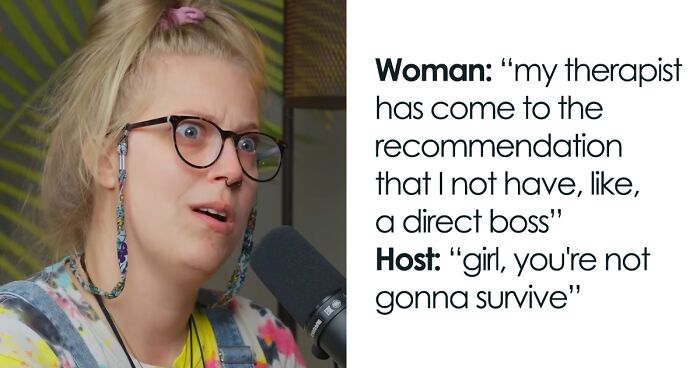

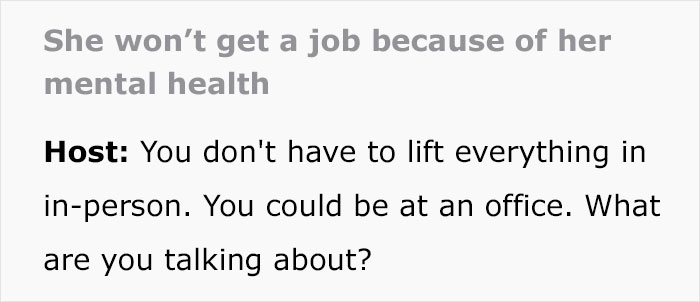
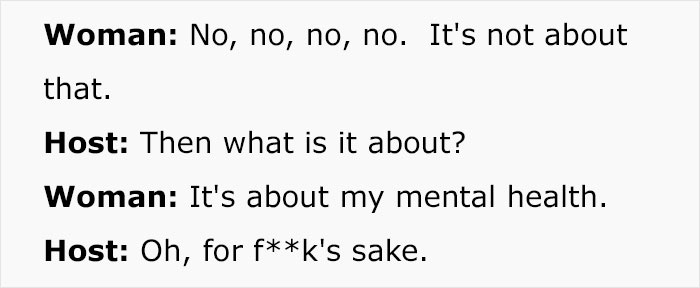
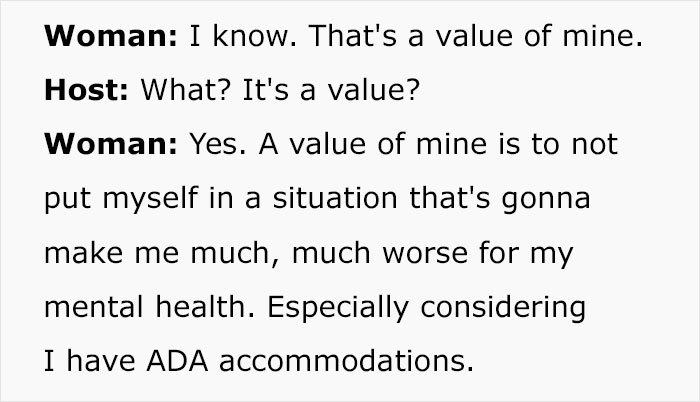


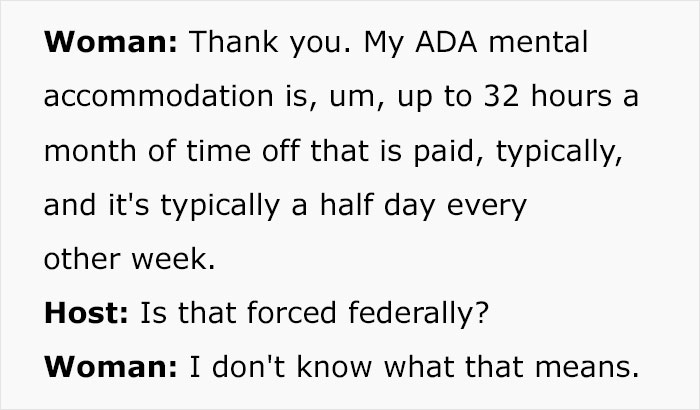

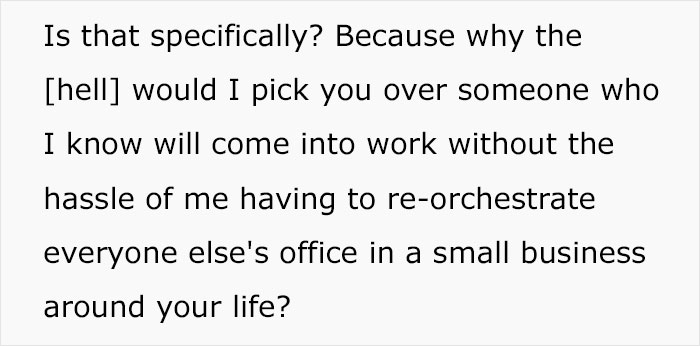
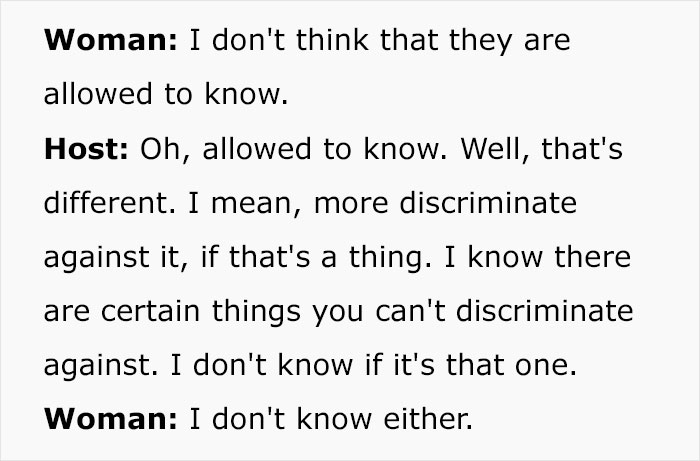


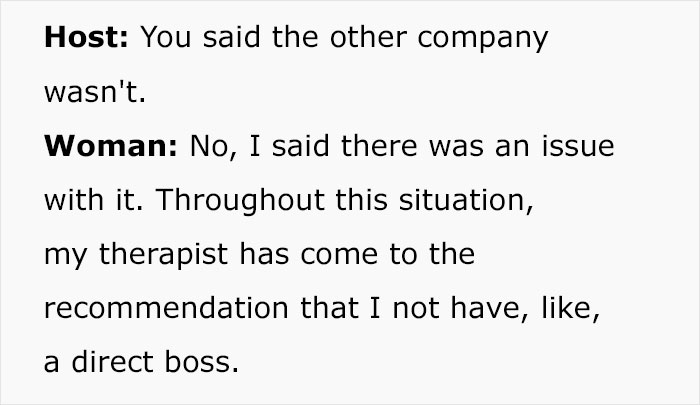


































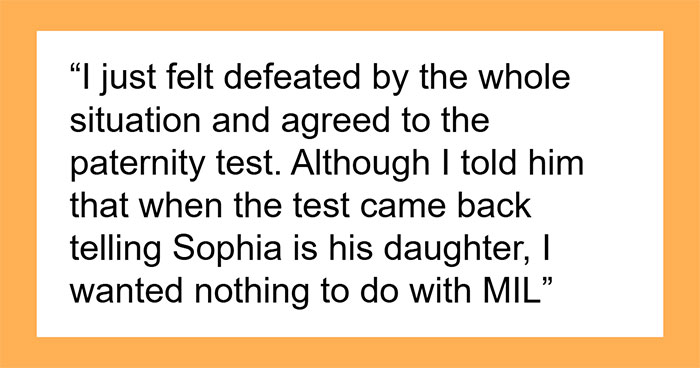




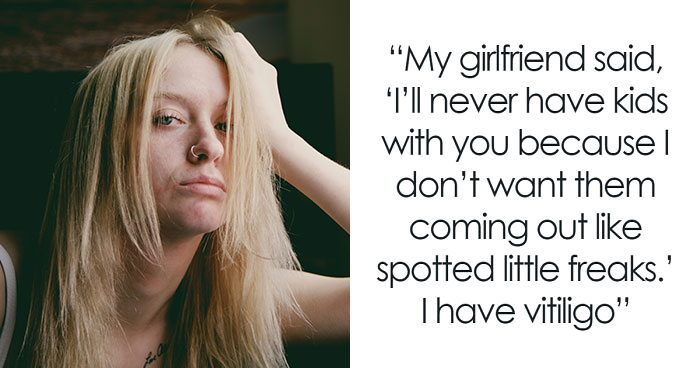



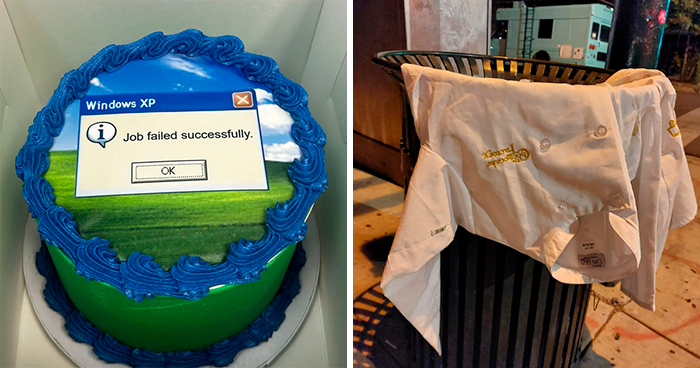


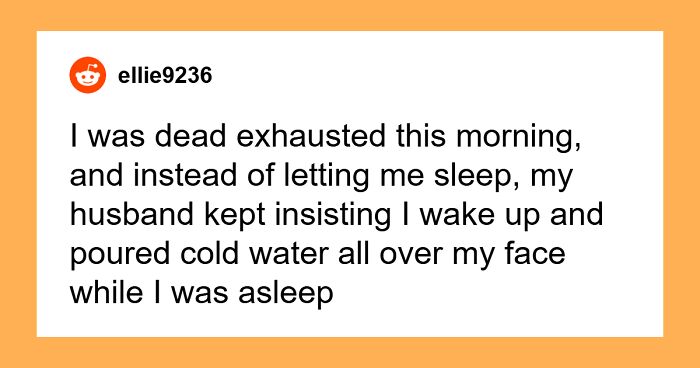

27
20